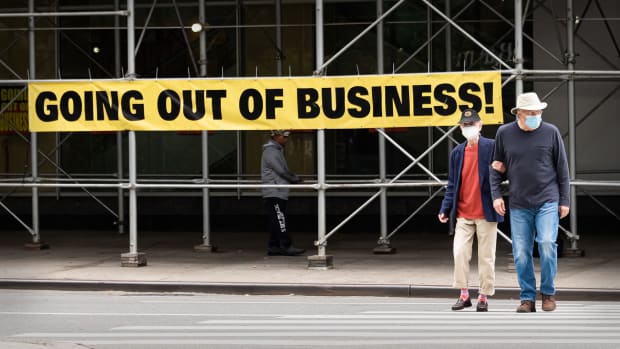Whether it is meme stocks, crypto plays or just good old fashioned long-term holds or bonds, investors across the market are divided over whether or not America is currently in — or headed toward — a recession.
Experts on both sides of the aisle argue that things like a looming autumn full of covid, snarled supply chains and tightened interest rates could slow growth.
But they diverge on how long those economy chillers might last, and how well regulators are doing at heading off any serious, deep impact recession.
Defined by two consecutive quarters of negative GDP growth, a recession affects different people and sectors in different ways.
But with midterms coming up for control of Congress, a sitting president scrambling to head off inflation without killing growth, and an avalanche of conflicting economic data, predicting when or how badly a recession arrives is beginning to come into focus.

Noam Galai/Getty Images
Thomas Samuelson, chief investment officer at Vineyard Global Advisors, said that by all traditional measurements, a recession is at least somewhat upon us.
"Based on the conventional definition of a recession being two consecutive quarters of negative GDP growth, we are currently in a recession," he told TheStreet.
Mayra Rodriguez Valladares is a managing partner at MRV Associates, a financial consulting firm that provides training and research.
Valladares told TheStreet that investors who follow policy decisions are going to be able to anticipate market changes the fastest.
She said there are market players currently benefiting from inflation sitting at 8.5% as of June.
"Banks will benefit from inflation because they now charge more for all credit products such as mortgages and credit cards," she said. "Also, those banks that have big trading desks can benefit from the volatility that sometimes arises with big macroeconomic changes, such as interest rate hikes."
So What Happens if We Do Go Into a (Worse) Recession?
Both Valladares and Samuelson said that the specter of more covid cases this fall and more disruptions to global trade because of it could plunge the nation much deeper into a recession than anything investors are experiencing now.
"I am worried that this inflation number may be a one-off," Valladares said. "When the fall and especially, winter comes in, we are likely to see more incidents of covid which will contribute to supply chain disruptions. I do not think that inflation has been conquered already."
That could combine with aggressive policies aimed at curbing inflation to create an environment that could be too tough for consumers to climb out of without direct government intervention.
Where policymakers wind up on rate cuts could be a huge factor in a recession developing and how damaging it could be.
"If rates continue to go up globally, we will go into a deep recession," Valladares said. "Inflation pressure means that the cost of borrowing goes up for all consumer and corporate borrowers. When both start to reduce spending, avoiding a recession will be practically impossible."
Can a Recession in 2022 be Averted?
The trick now will be walking the fine line between tamping down corporate, personal and government spending, and keeping spending high enough to fuel growth.
That's not an easy task, market watchers said, but there are some tea leaves to read in daily financial news.
"If we do have a recession, the average decline is 35% over a 12-month period, which would take the S&P 500 down to 3150, which would be a decline of 25% to 30% from [the Aug. 13] close," Samuelson said.







